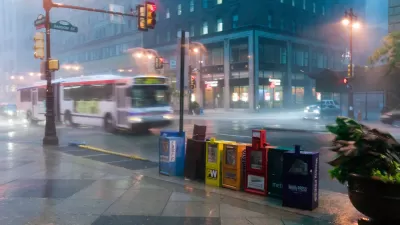A pair of articles pushes back on a recent study that claims public transit use in the United States is reaching record levels.
David King, Michael Manville and Michael Smart pen an op-ed for the Washington Post regarding the recent report by the American Public Transportation Association (APTA) that celebrated a record 10.65 billion transit trips in 2013. (The Washington Post op-ed follows another article by Wendell Cox, who also found flaws in the narrative presented by the APTA about the surge in transit ridership.)
The opinionators make it clear that they support public transportation, “but misguided optimism about transit’s resurgence helps neither transit users nor the larger traveling public.” The crux of their argument: “Many numbers look impressive without denominators, but anyone who examines transit use as a rate — whether as trips per person or share of total travel — will find that transit is a small and stagnant part of the transportation system.” They focus on the deficiencies of the nation’s transit systems, and the negative externalities caused by the dominant mode of driving. “No one should pretend these problems are spontaneously solving themselves because Americans have decided en masse to ride transit instead of driving.”
In a separate article, Eric Jaffe also picks up the pieces of the uncritically exuberant response to the report by focusing on a reason for the continued transportation dominance of cars in the United States: “Incentivizing transit use will only go so far without disincentivizing car use.” Jaffe also reminds advocates not to get caught up in futuristic transit solutions. “Many of the tools to ease the mobility problems facing cities can be found right here in the present.” Moreover, “the practical truth is that good public transit must be in place before metro areas can realistically think about making it more expensive to drive.”
FULL STORY: Use of public transit isn’t surging

Study: Maui’s Plan to Convert Vacation Rentals to Long-Term Housing Could Cause Nearly $1 Billion Economic Loss
The plan would reduce visitor accommodation by 25,% resulting in 1,900 jobs lost.

Alabama: Trump Terminates Settlements for Black Communities Harmed By Raw Sewage
Trump deemed the landmark civil rights agreement “illegal DEI and environmental justice policy.”

North Texas Transit Leaders Tout Benefits of TOD for Growing Region
At a summit focused on transit-oriented development, policymakers discussed how North Texas’ expanded light rail system can serve as a tool for economic growth.

Paris Bike Boom Leads to Steep Drop in Air Pollution
The French city’s air quality has improved dramatically in the past 20 years, coinciding with a growth in cycling.

Why Housing Costs More to Build in California Than in Texas
Hard costs like labor and materials combined with ‘soft’ costs such as permitting make building in the San Francisco Bay Area almost three times as costly as in Texas cities.

San Diego County Sees a Rise in Urban Coyotes
San Diego County experiences a rise in urban coyotes, as sightings become prevalent throughout its urban neighbourhoods and surrounding areas.
Urban Design for Planners 1: Software Tools
This six-course series explores essential urban design concepts using open source software and equips planners with the tools they need to participate fully in the urban design process.
Planning for Universal Design
Learn the tools for implementing Universal Design in planning regulations.
Smith Gee Studio
Alamo Area Metropolitan Planning Organization
City of Santa Clarita
Institute for Housing and Urban Development Studies (IHS)
City of Grandview
Harvard GSD Executive Education
Toledo-Lucas County Plan Commissions
Salt Lake City
NYU Wagner Graduate School of Public Service



























